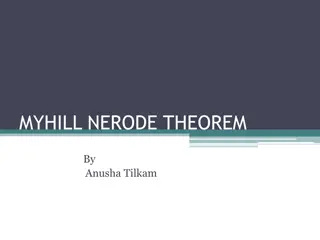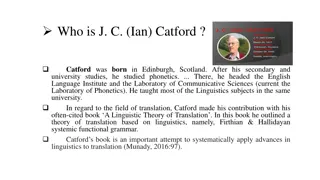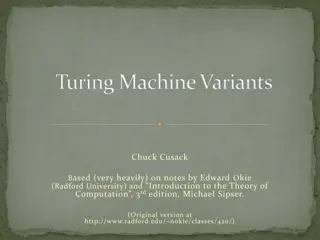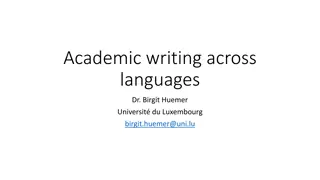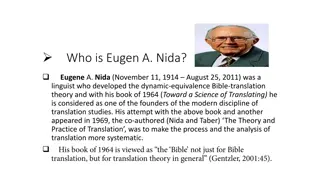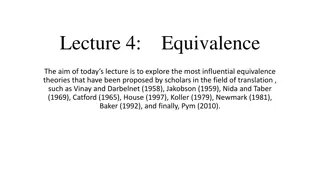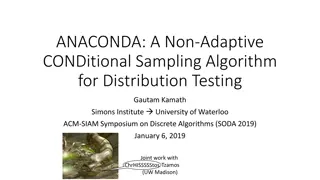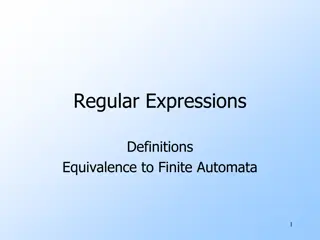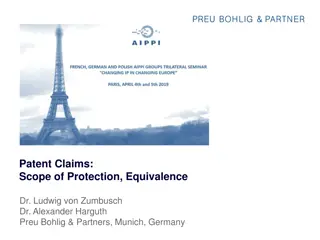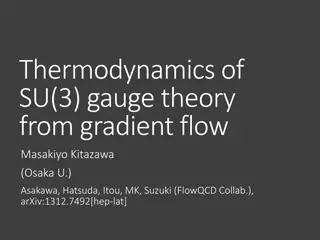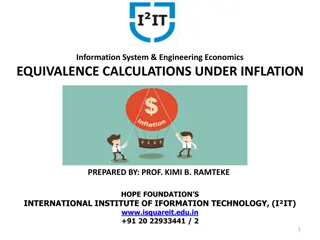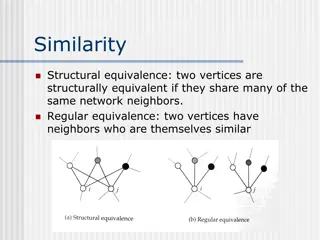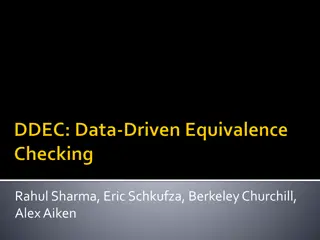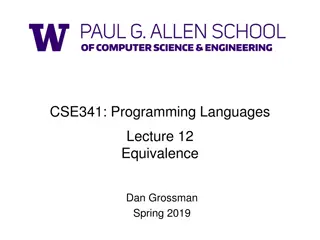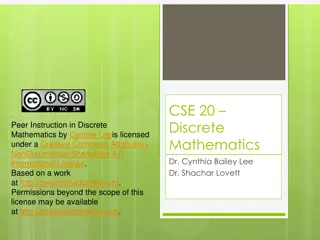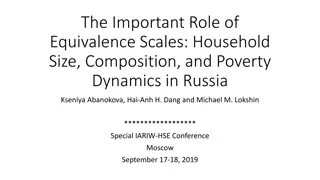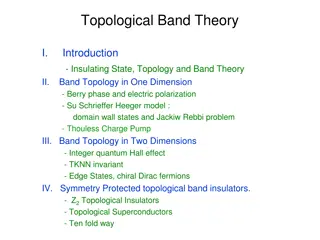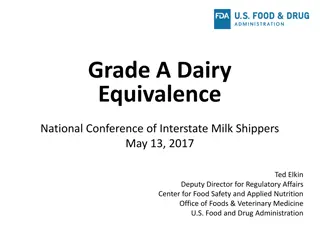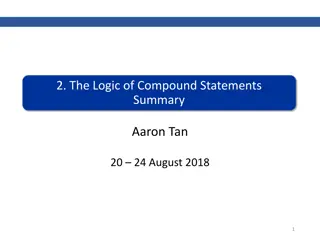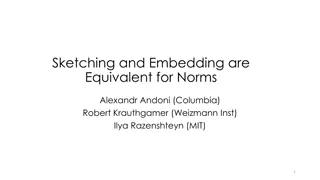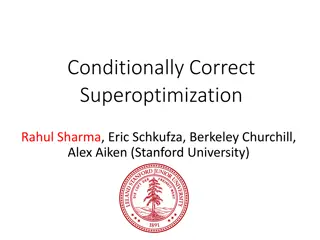Understanding Logical Form and Equivalence in Conditional Statements
Delve into the intricacies of logical form, equivalence, and compound statements in the realm of propositional logic. Explore valid and invalid arguments, conditional statements, and the logic of compound statements with puzzles to sharpen your logical reasoning skills. Unravel scenarios like determ
2 views • 81 slides
Evolution of Mathematical Theories and Proof Systems
Development of mathematical theories such as model theory, proof theory, set theory, recursion theory, and computational complexity is discussed, starting from historical perspectives with Dedekind and Peano to Godel's theorems, recursion theory's golden age in the 1930s, and advancements in proof t
1 views • 29 slides
Psychological Theories of Criminality: Understanding the Roots
Psychological theories of criminality delve into the association between intelligence, personality, learning, and criminal behavior. Major theories include Psychodynamic Theory by Freud, Behavioral Theory by Bandura, and Cognitive Theory by Kohlberg. These theories explore how unconscious mental pro
1 views • 20 slides
Understanding the Theory of Firms: Neoclassical vs. Modern Approaches
The theory of firms is explored through the Neoclassical and Modern perspectives. Neoclassical theory focuses on profit maximization, while Modern theory delves into managerial, principal-agent, and transaction cost theories. The discussion covers criticisms of Neoclassical theory and the essential
1 views • 79 slides
Understanding Myhill-Nerode Theorem in Automata Theory
Myhill-Nerode theorem states that three statements are equivalent regarding the properties of a regular language: 1) L is the union of some equivalence classes of a right-invariant equivalence relation of finite index, 2) Equivalence relation RL is defined in a specific way, and 3) RL has finite ind
1 views • 20 slides
Understanding J.C. Catford's Linguistic Theory of Equivalence in Translation
J.C. Catford, a prominent figure in translation studies, developed a theory of equivalence in translation based on functional linguistics. His work emphasizes the process of substituting text from one language to another, focusing on formal and textual equivalence. Catford's theory sheds light on ho
2 views • 12 slides
Turing Machine Variants and Equivalence Theorems Summary
Explore different variants of Turing machines, such as stay-put TMs and multi-tape TMs, along with key results like the equivalence theorems. Understand the idea behind simulating multi-tape TMs with single-tape TMs and how different models are related. Dive into the proofs and implications of these
0 views • 14 slides
Theories of Causation in Psychological and Social Sciences
Overview of theories of causation categorized into psychological, social psychological, and sociological perspectives. Psychological theories focus on instinctive, biological, and psychological qualities of abusers, including Attachment Theory, Psychodynamic Theory, Social Learning Theory, and Situa
0 views • 15 slides
Understanding Political Theory through a Contextual Approach
Exploring G.H. Sabine's perspective on political theory through a contextual approach, emphasizing the importance of historical context and societal influences. Sabine argues that while political theory evolves with its contemporary politics, it should be analyzed within its specific time and social
0 views • 9 slides
Understanding Equivalence Class Testing and Its Application in Software Testing
Equivalence class testing is a software testing technique that involves dividing input values into classes for effective testing coverage. Equivalence classes are defined mathematically as subsets of a given set, ensuring partitioning and mutual exclusivity. By applying equivalence partitioning, tes
1 views • 21 slides
Understanding Academic Writing Across Languages: Challenges and Solutions
Explore the historical development of languages in academia and science, equivalence issues, written academic genres, evolution from Latin to national academic languages, and the importance of a common language in academia. Dive into the specialized text structures, syntax, idiomatic phrases, and pr
0 views • 29 slides
Eugene A. Nida - Pioneer of Dynamic Equivalence Bible Translation Theory
Eugene A. Nida (1914-2011) was a linguist who revolutionized Bible translation theory with his concept of dynamic equivalence. Through works like "Toward a Science of Translating," he shaped modern translation studies. Nida's theory distinguishes between formal and dynamic equivalence, favoring the
0 views • 10 slides
Equivalence Relations and Partition Induced Relations
The concept of equivalence relations and partition-induced relations on sets are explored. Equivalence relations satisfy reflexivity, symmetry, and transitivity, making them important in various mathematical contexts. The relation induced by a partition of a set is shown to be an equivalence relatio
0 views • 24 slides
Understanding Equivalence Theories in Translation Studies
Exploring influential equivalence theories by scholars such as Vinay and Darbelnet, Jakobson, Nida and Taber, Catford, House, Koller, Newmark, Baker, and Pym. Equivalence plays a central role in translation studies, but the concept remains debatable and controversial. The nature of equivalence raise
4 views • 10 slides
Evolution of Light Theory: From Wave Theory to Quantum Theory
At the turn of the century, the discovery of the photoelectric effect challenged the wave theory of light, leading to the development of the quantum theory by Max Planck and Albert Einstein. This new theory introduced the concept of discrete energy units known as quanta, bridging the gap between wav
1 views • 62 slides
Distribution Testing Algorithms for Property and Equivalence Testing
Distributional Property Testing involves determining if a sample satisfies a given property or is from a specific distribution. The ANACONDA algorithm and other methods are used to test for uniformity, identity, and equivalence of distributions in various domains. Results show complexities and chall
2 views • 24 slides
Equivalence of Regular Expressions and Finite Automata
Regular expressions are an algebraic method to describe languages, specifically the regular languages. They are defined recursively based on symbols and operations such as concatenation and closure. Precedence rules and examples are also provided. The equivalence between regular expressions and fini
0 views • 25 slides
Dp-branes, NS5-branes, U-duality, and M-Theory Overview
Overview of Dp-branes, NS5-branes, and U-duality derived from nonabelian (2,0) theory with Lie 3-algebra. Introduction to M-theory, including M2-branes and M5-branes in the strong coupling limit. Discussion on BLG theory, Lorentzian Lie 3-algebra, and the ABJM theory for M2-branes.
1 views • 32 slides
Understanding Propositional Logic and Logical Operators
Learn about propositional logic, statements, logic operators, compound statements, exclusive-or, logical equivalence, and writing logical formulas for truth tables. Explore how to create compound statements for exclusive-or using different approaches and ensure logical equivalence. Enhance your know
0 views • 26 slides
Understanding the Acceleration of the Universe and the Equivalence Principle Violation in the Horndeski Vector-Tensor Theory
Exploring the implications of the Equivalence Principle Violation after reheating in the context of the accelerated expansion of the universe. The study delves into the Horndeski vector-tensor theory, gravitational waves, and the impact of modified gravity and dark energy. Insights are provided on t
2 views • 20 slides
Translation Strategies and Equivalence Models in Modern Translation Studies
In modern translation studies, the concept of equivalence and different translation strategies are explored. Scholars have debated the subjectivity involved in translation, with some advocating for a descriptive approach while others stick to prescriptive discussions of equivalence. Influenced by pa
0 views • 10 slides
Understanding Patent Claims and Equivalence Principle in European Patent Law
European patent law, specifically Art. 69 EPC and the equivalence principle, play a crucial role in determining the scope of protection conferred by a patent. The importance of patent claims, interpretation guidelines, and the concept of equivalence are highlighted, emphasizing the balance between p
1 views • 16 slides
Understanding Logical Relations in Programming Languages
Explore the concept of logical relations in programming languages, focusing on the relation between high-level and low-level programs. Learn about contextual equivalence, its benefits and limitations, and how logical relations offer a robust framework for defining program equivalence. Discover why l
0 views • 18 slides
Understanding Time-Independent Perturbation Theory in Quantum Mechanics
Perturbation theory is a powerful tool in solving complex physical and mathematical problems approximately by adjusting solutions from a related problem with known solutions. This theory allows for more accurate approximate solutions by treating the difference as a small perturbation. An example inv
0 views • 19 slides
Exploration of Thermodynamics in SU(3) Gauge Theory Using Gradient Flow
Investigate the thermodynamics of SU(3) gauge theory through gradient flow, discussing energy-momentum stress pressure, Noether current, and the restoration of translational symmetry. The study delves into lattice regularization, equivalence in continuum theory, and measurements of bulk thermodynami
0 views • 40 slides
Ethical Theories: Divine Command vs. Virtue Theory Explained
Divine Command Theory asserts that morality is derived from God's commands, contrasting with Virtue Theory which focuses on developing moral virtues to achieve human flourishing and excellence. Divine Command Theory relies on religious texts, while Virtue Theory emphasizes the cultivation of virtues
0 views • 24 slides
Understanding Equivalence Calculations Under Inflation
Equivalence calculations under inflation involve assessing the impact of changing prices on the purchasing power of money over time. Key concepts include CPI, inflation, and comparing costs across different periods. This content discusses how inflation affects consumer behavior and provides insights
0 views • 12 slides
Understanding Fermi Liquid Theory in Interacting Fermion Systems
Fermi liquid theory, also known as Landau-Fermi liquid theory, is a theoretical model that describes the normal state of metals at low temperatures. Introduced by Landau and further developed by Abrikosov and Khalatnikov, this theory explains the similarities and differences between interacting ferm
0 views • 23 slides
Structural Equivalence and Similarity Measures in Network Analysis
This content discusses the concepts of structural equivalence and regular equivalence in network analysis. Structural equivalence is based on shared network neighbors, while regular equivalence considers the similarities of neighboring vertices. Various measures, such as cosine similarity and Pearso
0 views • 12 slides
Ensuring Equivalence in Compiler Optimization Programs
Explore the challenges of proving equivalence in compiler optimization programs, validate refactorings, and analyze the trustworthiness of compilers through binary equivalence testing. Learn about handling loops, utilizing decision procedures, and running tests to confirm program behavior.
0 views • 24 slides
Understanding Equivalence in Programming Languages: CSE341 Lecture Summary
In CSE341's Programming Languages lecture, Equivalence is explored as the fundamental software engineering concept of determining if two pieces of code are equivalent. The focus is on code maintenance, backward compatibility, optimization, and abstraction. Equivalence is defined by having the same o
1 views • 14 slides
Peer Instruction in Discrete Mathematics
Explore the world of discrete mathematics with Dr. Cynthia Bailey Lee and Dr. Shachar Lovett through peer instruction. Dive into topics like step-by-step equivalence proofs and the equivalence of logical operators. Discover the different methods to show propositions are equivalent and delve into log
0 views • 14 slides
Theories of Interest in Microeconomics II
Explore various theories of interest in economics, including the Classical Theory, Liquidity Preference Theory by Keynes, Productivity Theory, Abstinence Theory, Time-Preference Theory, Fisher's Time Preference Theory, and the Loanable Fund Theory. These theories offer different perspectives on the
0 views • 6 slides
The Important Role of Equivalence Scales in Poverty Dynamics
Equivalence scales play a crucial role in measuring household welfare and poverty dynamics in Russia. This study explores the impact of adjusting scales on poverty lines, chronic poverty, and income mobility using subjective well-being data. The findings reveal higher elasticity for adding adults to
0 views • 26 slides
Exploring Topological Band Theory and Quantum Phases in Electronic Matter
Delve into the fascinating realm of topological band theory, examining the insulating state, band topology in different dimensions, symmetry-protected topological band insulators, and the interplay between symmetry and topology. Uncover the principles underlying matter symmetry, quantum phases, and
0 views • 29 slides
Understanding Equivalence in Dairy Regulations
Equivalence in dairy regulations is a crucial concept ensuring that different food safety systems offer the same level of public health protection. This involves assessing foreign food safety systems for compliance with US standards, particularly in Grade A dairy products regulated under the Pasteur
0 views • 16 slides
Understanding Compound Statements in Logic
The summary discusses the logic of compound statements, covering logical form, equivalence, tautologies, contradictions, conditional statements, valid and invalid arguments, and more. It explains the definitions of statements, negation, conjunction, disjunction, statement form, logical equivalence,
0 views • 12 slides
Sketching and Embedding Equivalence for Norms in Metric Spaces
Sketching and embedding techniques are explored by Alexandr Andoni, Robert Krauthgamer, and Ilya Razenshteyn in the context of metric spaces. This research delves into the equivalence between sketching and embedding for various norms, addressing topics such as compressing high-dimensional objects, s
0 views • 15 slides
Superoptimization: Accelerating Code Performance through Conditional Correctness
Explore the concept of superoptimization, a technique to generate optimal code implementations for performance-critical systems. The process involves enumerating all possible programs, transforming them with loops, and proving equivalence with the original code. While optimizations are formally veri
0 views • 22 slides
Analyzing Precipitation Titrations and Spectroscopy in Chemistry Lecture
Exploring the concepts of precipitation titrations and spectroscopy in a chemistry lecture covering topics such as titration curves, sharpness at equivalence points, and titration of mixtures. The lecture delves into examples like the titration of Hg2^2+ by CrO4^2-, emphasizing the three regimes bef
0 views • 17 slides




